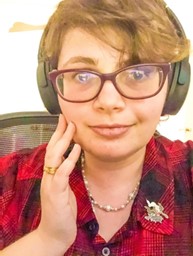PUBLISHED: 28th March 2025

by Scarlett Shiloh
Colonoscopies are not a topic many people enjoy discussing, yet they are vital for detecting and preventing colorectal cancer. For neurodivergent individuals—people whose brains develop and work differently from what is typical—the challenges surrounding colonoscopies can be even more pronounced, with unique and often overlooked sensory and communication needs. As a neurodivergent living with Lynch syndrome—a hereditary cancer disorder that significantly increases my risk of colon cancer—regular colonoscopies are a medical necessity. For me, this means undergoing the procedure annually.
Colonoscopies are vital for everyone
While colonoscopies are essential for Lynch syndrome patients and others at high risk for colon cancer, they are also critical for the general population. The American Cancer Society recommends regular screening starting at age 45 for individuals at average risk, with follow-ups every 10 years thereafter. Beyond cancer detection, colonoscopies can identify other gastrointestinal conditions such as Crohn’s disease, inflammatory bowel disease (IBD) and irritable bowel syndrome (IBS). Notably, autistic individuals are at higher risk for certain GI disorders like IBS, underscoring the need for accessible care in this community.
Navigating colonoscopy preparation: A zine is born
Initially, the prospect of colonoscopy preparation filled me with dread, not because of the procedure, but due to the preparation process. The prep had been described to me as unpleasant, involving a foul-tasting liquid that could trigger my neurodivergent sensory sensitivities. My aversion to bad-tasting foods and drinks made consuming these prep solutions extremely daunting.
Discovering a preparation method that worked well—a mixture of Gatorade and MiraLAX—brought relief and frustration. Why hadn’t any healthcare provider mentioned this option before? Why wasn’t it more widely discussed? This revelation inspired me to create a resource that could help others in similar situations. In January 2025, I published How to Get a Colonoscopy: Advice for the Neurodivergent and Everyone! with Microcosm Publishing.
The zine provides practical guidance in plain language, making it accessible to a broad audience. It addresses the technical aspects of colonoscopy preparation while offering emotional support—a crucial element often missing in medical advice. Many patients have shared that they wished this information had been available earlier, highlighting the gap in resources that are tailored to patient experiences.
The link to purchase access to my zine can be found by clicking here.
Helping others cope with colonoscopy prep
One of the most significant sections of the zine focuses on colonoscopy preparation strategies. It outlines prep methods and provides insights into what each might entail, helping patients approach the process with knowledge rather than fear. For neurodivergent individuals, this can be particularly empowering, as understanding what to expect reduces anxiety and sensory overload.
The zine incorporates coping techniques from cognitive behavioral therapy (CBT) and dialectical behavioral therapy (DBT). These strategies can help manage various stages of the process, whether adhering to the prep diet, handling the day-before cleansing routine or coping with scanxiety afterward. Additionally, it includes tips on advocating for accommodations from healthcare providers, enabling patients to receive care tailored to their needs.
Bridging gaps in healthcare
This zine aims to improve outcomes for patients and healthcare providers. Offering insights into the specific challenges faced by neurodivergent individuals equips professionals—including speech pathologists and therapists—with tools to better support their patients. This reduces the burden on neurodivergent individuals who often struggle to advocate for themselves in medical settings.
Caregivers and support networks can also benefit from these resources, using them to assist patients in navigating appointments and advocating effectively. The zine can be placed in doctor’s offices or clinics alongside other educational materials or made available through libraries and social media groups focused on GI care.
Making GI care accessible
There is still much work to be done at individual, community and systemic levels to make colonoscopies and comprehensive GI care more accessible. Colonoscopies are an indispensable procedure, not just for hereditary cancer patients, but for everyone. By addressing barriers such as sensory sensitivities, communication challenges and lack of tailored resources, we can improve healthcare accessibility and reduce rates of colorectal cancer and other GI conditions.
Through efforts like this zine and continued advocacy, we can empower patients with knowledge while encouraging providers to deliver more inclusive care. Together, we can make colonoscopies less daunting and more accessible for all individuals, neurodivergent or otherwise.

Scarlett K. Shiloh (they/them) is an artist, writer, and hobby collector in the greater Boston, MA area. Their interest and advocacy for more inclusive medical care began with their Lynch syndrome (a genetic cancer disorder) diagnosis at 25, and having to navigate unempathetic and cishetnormative spaces. They work in advocacy with hospitals & volunteer organizations on social media efforts and advocating for support for neurodiverse and LGBTQ+ genetic cancer patients. Scarlett writes & creates fictional & non-fictional content reflecting personal experiences about experiences with gender identity, polyamory, BDSM, and hereditary cancer. Scarlett has a BA in Visual/Media Arts from Emerson College with a minor in American Sign Language, and a Communication Design Certificate from Massachusetts College of Art & Design.
POSTED IN: Voices , Screening And Prevention , Diversity And Inclusion
TAGS: Hereditary Cancer , Cancer Prevention , Lynch Syndrome , LGBTQ , Colorectal Cancer , Colonoscopy , Neurodiverse